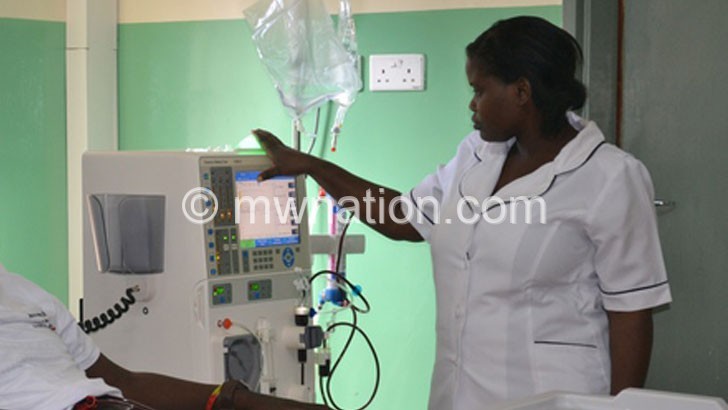Patients suffer as dialysis machine breaks down
He previously travelled from the Eastern Region to Blantyre to access a dialysis machine for his kidney problem. Now he has to cover about 300 kilometres to Lilongwe, like many others, to save his dear life.
Each agonising distance covered to access treatment tells a story of a convoluted and crumbling health delivery system that exemplifies how far away the country is to meet its health needs.

Desperate cries from John Banda for the government to quickly fix five dialysis machines at Queen Elizabeth Central Hospital (QECH) is heartbreaking when one realises it is almost 60 years since the country attained independence, yet dialysis machines remain a luxury.
The 45-year-old father of three, who has a chronic kidney problem, expressed his frustrations via telephone from his hospital bed at Kamuzu Central Hospital (KCH) in Lilongwe-the only other public hospital with dialysis machines-where he was referred to two weeks ago.
“The government needs to urgently do something about the situation,” he lamented.
Banda, who resides in Machinga District and travels to QECH to access dialysis treatment services monthly, described the situation as pathetic.
In a sickly low tone throughout our brief three-minute telephone interview, Banda described the referrals as a huge inconvenience, especially to his immediate family that has to find other means of travel to support him.
He is solely relying on KCH food since he has no relatives in Lilongwe or surrounding districts to bring him proper food.
All his relations are in Machinga with a few in Blantyre.
“It’s easy when I am at QECH because I know my relatives will be there to support me with proper food and other needs,” he said.
With his money slowly running out, Banda is not sure how long he will stay at KCH.
His prolonged stay worries him about contracting infectious diseases in the general ward he has been admitted to.
This, he fears, might weaken his immune system and, as such, worsen his condition.
Banda’s frustrations and fears mirror the situation of other patients in the same predicament.
For instance, Jonathan Longwe of Luchenza, said the situation is worrisome.
Speaking on the phone with difficulty from his hospital bed, Longwe said the situation makes patients feel hopeless; pointing out that this is not the first time for the machines to break down.
He said: “These machines often break down and at times we just feel hopeless, especially when referred to KCH.”
Another patient, who opted for anonymity, said it is sad that repairs on the machines to take so long.
“It is equally frustrating that the machines have to break down constantly with the repairs always taking long,” he said.
Our findings show that the QECH Dialysis Unit offers treatment to at least 25 adults who have end stage kidney disease (ESKD) requiring long-life treatment from Monday to Saturday. On the other hand, KCH serves about 34 patients who undergo dialysis twice a week.
The transfer of the patients means KCH is now overwhelmed by the referrals.
Nation on Sunday’s findings further established that repairing the machines would cost about K60 million.
The situation has attracted criticism from the Parliamentary Committee on Health as well as health rights activists who feel that such incidents can be easily avoided with the right decisions being made.
In an interview on Wednesday, Health and Rights Education Programme executive director Maziko Matemba said there is a need for decisive action.
He said: “It is so sad to hear of the breakdown of the dialysis machines at QECH which is one of the busiest hospitals in Malawi as far as providing specialised care in Malawi is concerned.
“Therefore, we would like to implore the Ministry of Health and QECH management to rectify this problem as a matter of urgency as it undermines the provision of healthcare as Malawi committed to Universal Health Coverage.”
Matemba further said it is worrisome that in such years, such important life-saving machines would break down and take time to repair; hence, inconveniencing and putting patients’ lives at further risk.
Parliamentary Committee on Health chairperson Mathews Ngwale said in a separate telephone interview that he will follow up on the matter.
“While the moving of the patients might be a good idea in the interim as this was an unforeseen situation, delays in the fixing will have an impact on those who will be waiting to access the services. I will have to follow up because two weeks is a long time,” he said.
But QECH director Dr Kelvin Mponda expressed optimism in a telephone interview that repairs of the machines would start by Thursday. He indicated that spare parts had arrived as of Thursday via DHL.
Mponda, however, said he could not provide fine details on how much it costs to repair the machines and was non-committal about whether they would start working immediately after the repairs.
He said: “We have a five-year service contract and a whole lump sum was made, so I cannot give exact details on how much it costs to make the repairs. I hope once the repairs are done, the machines will start working sooner.”
This is not the first time the Dialysis Unit at QECH to temporarily close.
In early 2014, QECH stayed several months without the machines after they broke down. Then in August of the same year, the government commissioned the new dialysis unit at the referral facility at a cost of about K45 million ($61 475).
But in 2016, the unit was also temporarily shut down after it had no reagents, a situation which put the lives of patients at risk.





